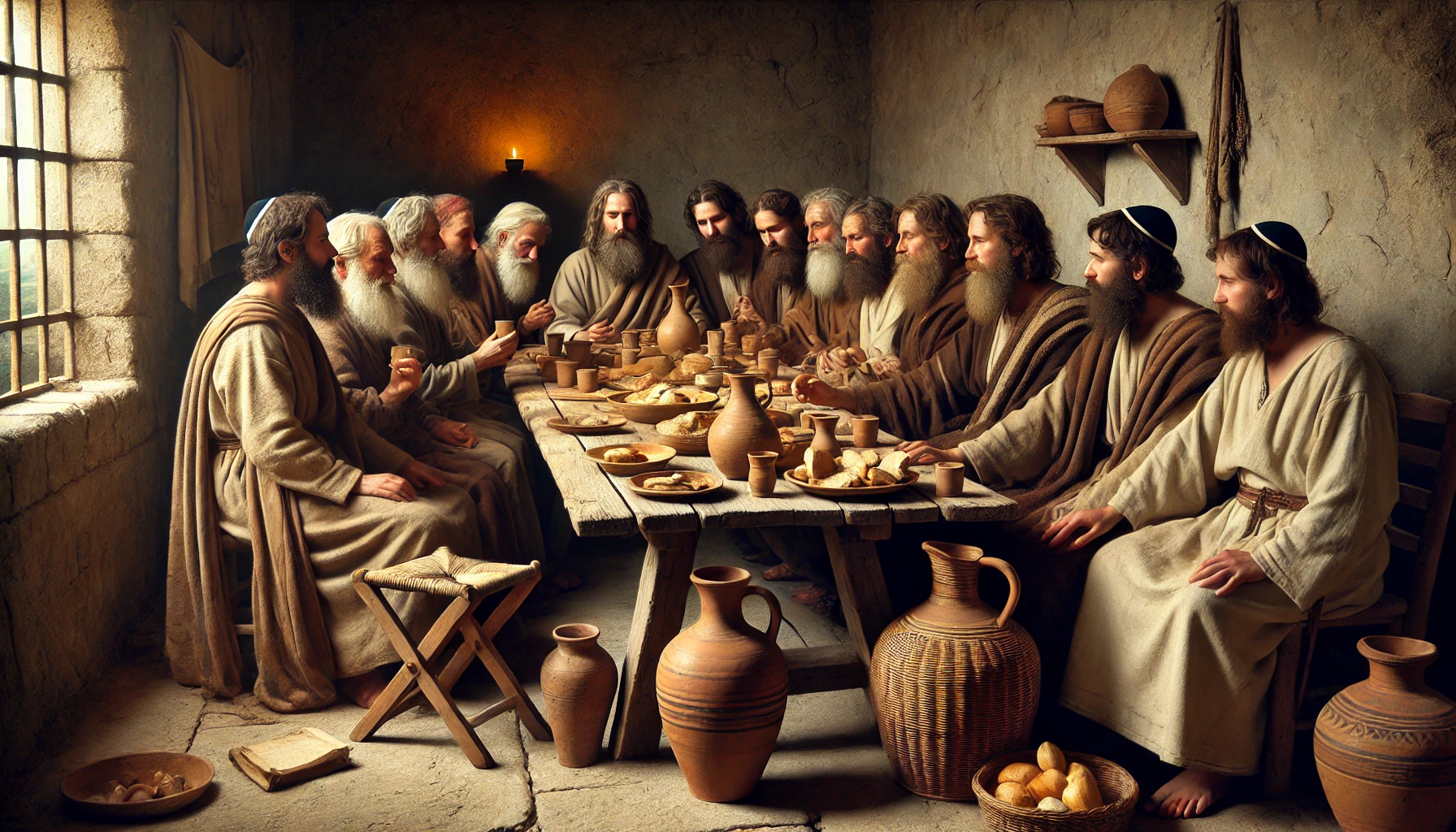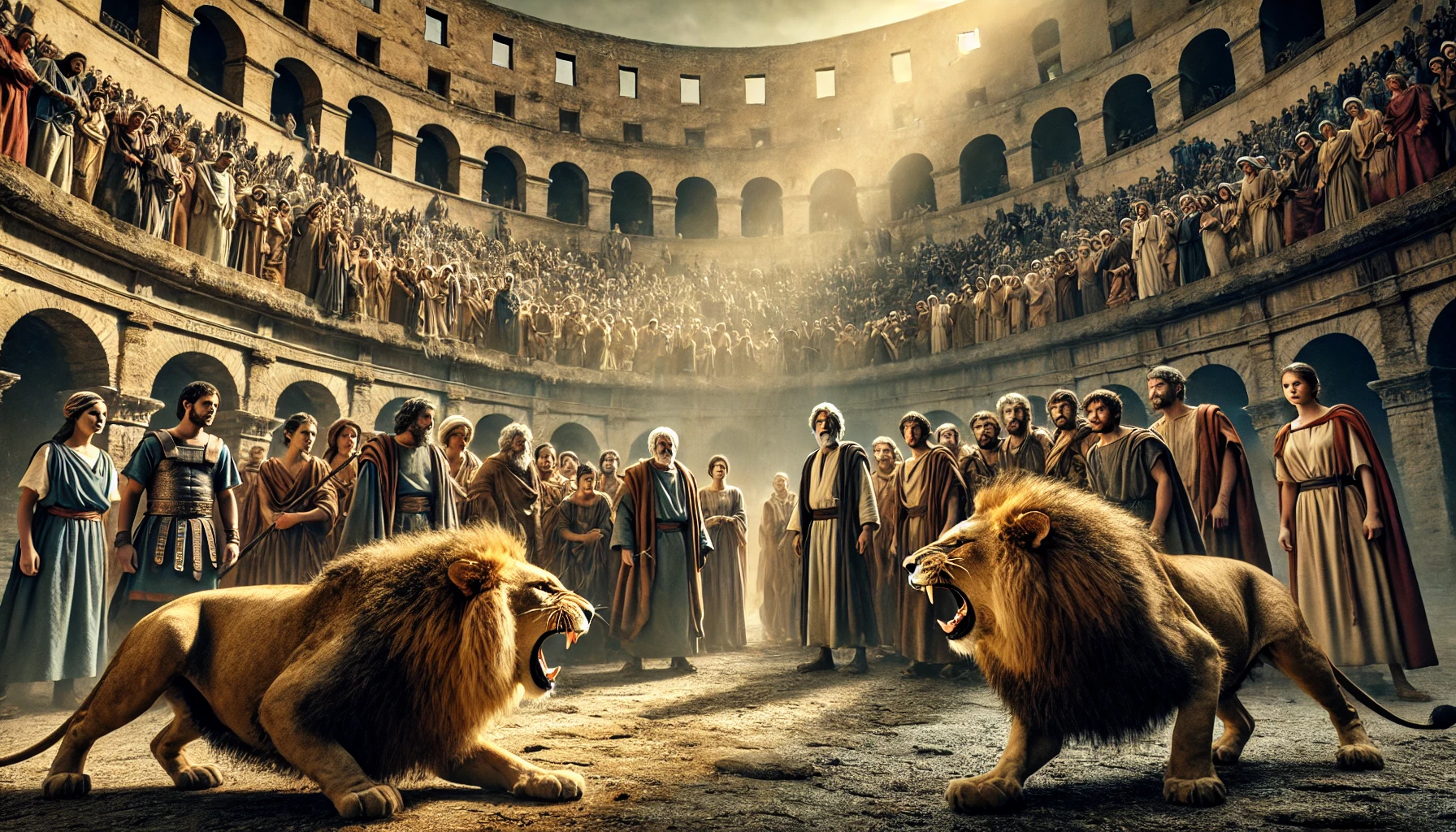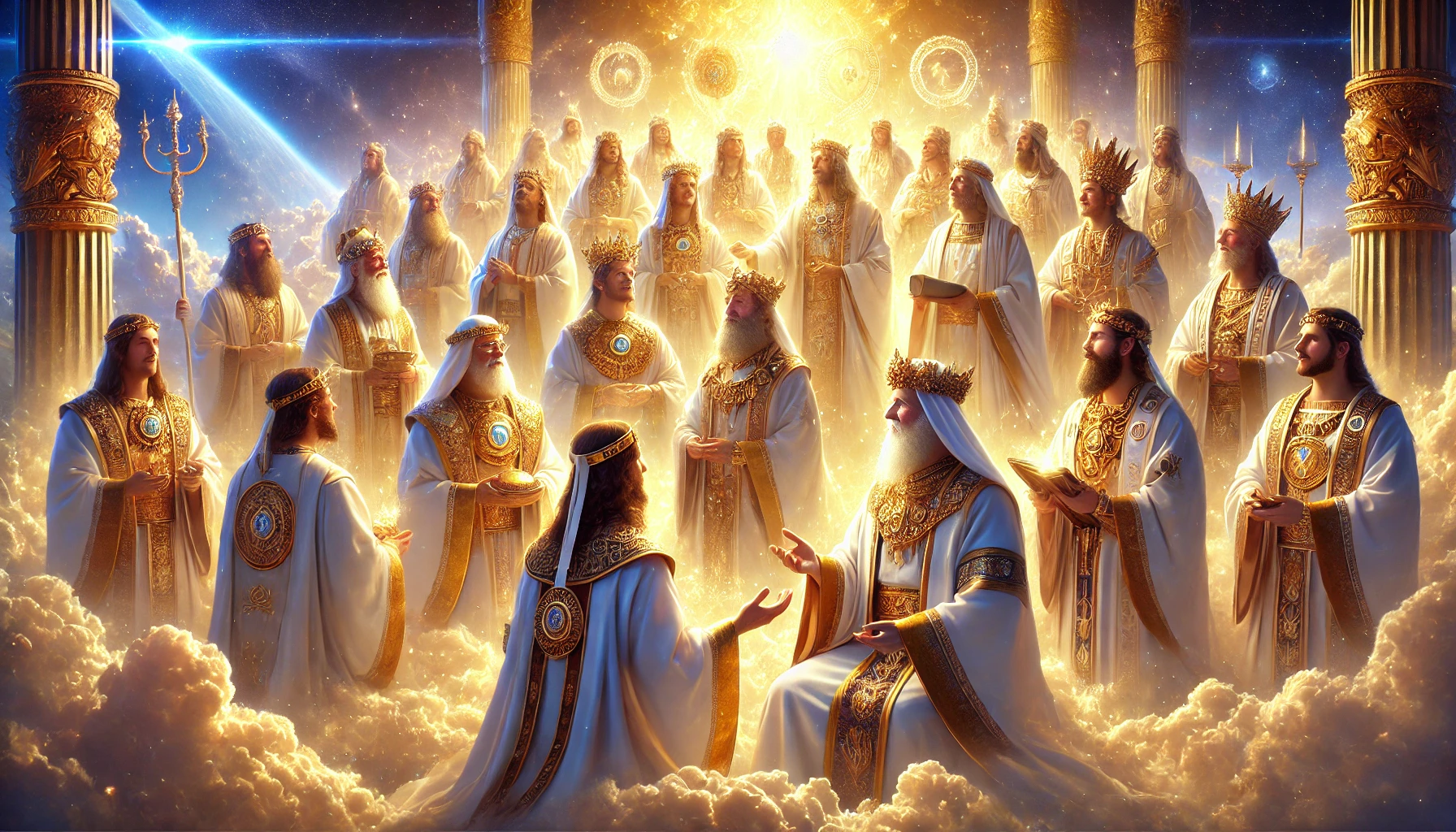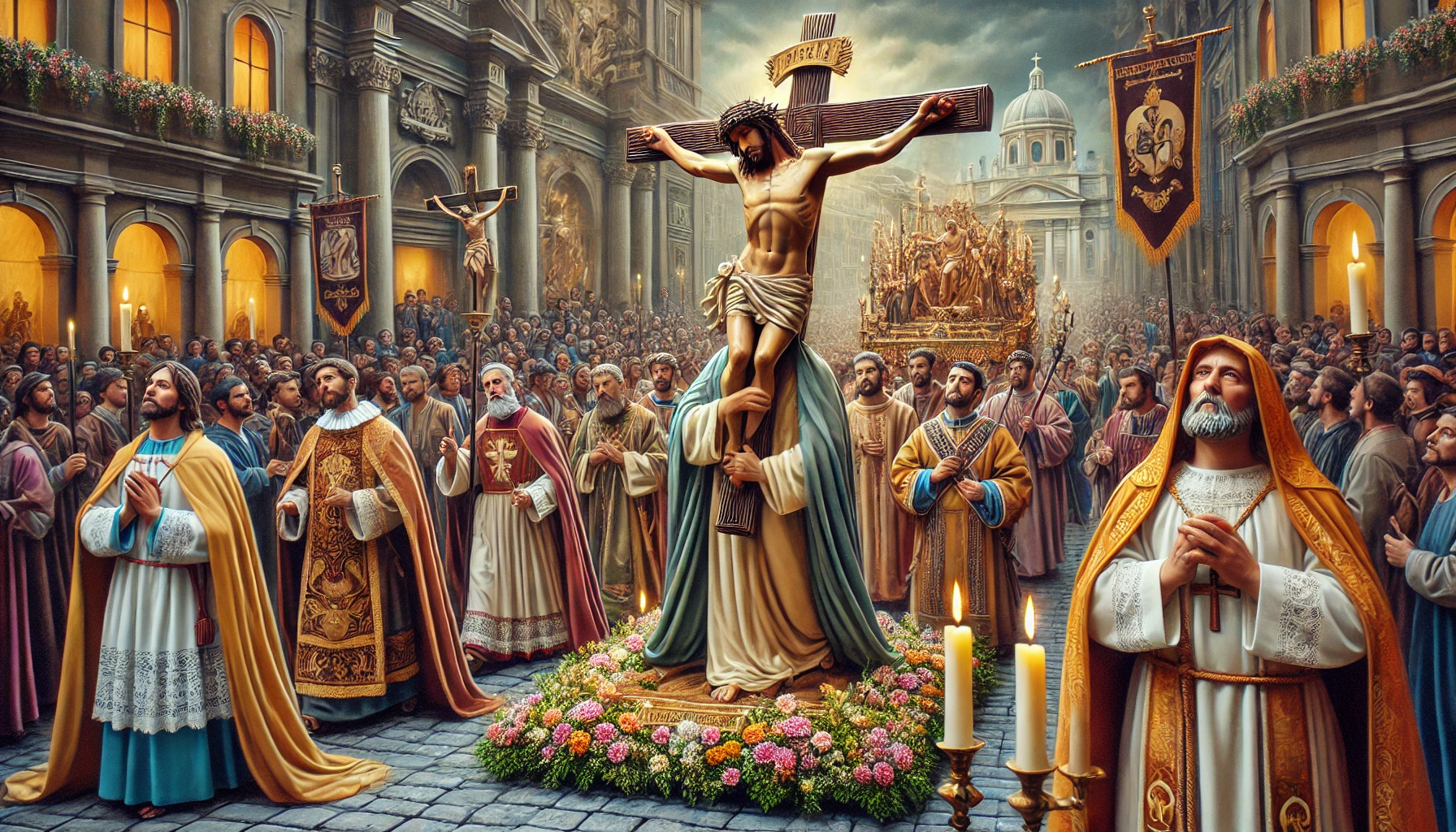Before God instructed Abram to leave his land and family, his father, Terah, had already decided to leave Ur of the Chaldeans and journey toward the land of Canaan. Genesis 11:27-32. During their journey, the family temporarily settled in Haran, where they stayed for several years. Eventually, Terah, Abram’s father, passed away in that place.
While in Haran, Terah’s family prospered greatly, including Abram and Lot. It was precisely there that God appeared to Abram and established a covenant with him. God promised that Abram’s descendants would become a great and powerful nation and that they would inherit the land of Canaan. In obedience, Abram prepared to leave: “He took his wife Sarai, his nephew Lot, all the possessions they had accumulated and the people they had acquired in Haran, and they set out for the land of Canaan, and they arrived there.” Genesis 12:5.
While Abram remained in Haran, God spoke to him in a dream, an experience that profoundly marked his life and strengthened his faith. In the dream, God revealed that He was calling Abram to something far greater than himself—a mission that would affect all future generations. God said: “The Lord had said to Abram, ‘Go from your country, your people and your father’s household to the land I will show you. I will make you into a great nation, and I will bless you; I will make your name great, and you will be a blessing. I will bless those who bless you, and whoever curses you I will curse; and all peoples on earth will be blessed through you.’” Genesis 12:1-3.
This covenant included not only promises of blessing and protection but also Abram’s commitment to obey and follow God’s call, leaving behind his comfort zone and everything familiar. This relationship of trust and obedience would lay the foundation for a new people consecrated to God.
God promised Abram that He would make him into a great nation, blessed and with a name that would be remembered for all generations. This promise reflected not only God’s intent to bless him but also His plan to establish through Abram a line of faith and obedience that would impact the entire world. Twenty-four years after leaving the land of Haran, God reaffirmed His covenant with Abram and said:
“When Abram was ninety-nine years old, the Lord appeared to him and said, ‘I am God Almighty; walk before me faithfully and be blameless. Then I will make my covenant between me and you and will greatly increase your numbers.’ Abram fell facedown, and God said to him, ‘As for me, this is my covenant with you: You will be the father of many nations. No longer will you be called Abram; your name will be Abraham, for I have made you a father of many nations. I will make you very fruitful; I will make nations of you, and kings will come from you. I will establish my covenant as an everlasting covenant between me and you and your descendants after you for the generations to come, to be your God and the God of your descendants after you. The whole land of Canaan, where you now reside as a foreigner, I will give as an everlasting possession to you and your descendants after you; and I will be their God.’ Then God said to Abraham, ‘As for you, you must keep my covenant, you and your descendants after you for the generations to come.’” Genesis 17:1-9.
This covenant contained the promise to make Abraham into a great and powerful nation, despite his old age and his wife Sarah’s barrenness. God assured Abraham that his descendants would inherit the land of Canaan, a place that would become their home and a symbol of God’s faithfulness. Yet more valuable than the possession of the land was the promise that the Lord would be their God, sustaining them through every generation.
Over the years, this covenant was confirmed at each stage of Abraham’s lineage, strengthening his faith and that of his successors. Thus, when God spoke to him, He said: “Your wife Sarah will bear you a son, and you will call him Isaac. I will establish my covenant with him as an everlasting covenant for his descendants after him.” Genesis 17:19. This covenant was reaffirmed once more through Joshua when he led the people of Israel into the Promised Land, reminding them of the purpose of the promise:
“The Israelites had moved about in the wilderness for forty years until all the men who were of military age when they left Egypt had died, since they had not obeyed the Lord. For the Lord had sworn to them that they would not see the land he had solemnly promised their ancestors to give us, a land flowing with milk and honey.” Joshua 5:6.
This succession of confirmations revealed that God’s covenant was not limited to a single moment or generation; it was a perpetual commitment, an alliance with His people that would shape their history and strengthen their faith in the God who fulfills His promises.
The promise God made to Abraham’s descendants was fulfilled approximately 4,000 years later in the modern nation of Israel. This historical event reaffirms God’s faithfulness to His covenant with Abraham and his descendants.
In 1948, the United Nations agreed to grant the land promised to Abraham to the people of Israel. For many, this return to the land of Canaan represented the fulfillment of the divine promise. God had declared His covenant with the patriarchs and reaffirmed it to Moses when He delivered Israel from Egypt:
“Then the Lord said to Moses, ‘Now you will see what I will do to Pharaoh: Because of my mighty hand he will let them go; because of my mighty hand he will drive them out of his country.’ God also said to Moses, ‘I am the Lord. I appeared to Abraham, to Isaac and to Jacob as God Almighty, but by my name the Lord I did not make myself fully known to them. I also established my covenant with them to give them the land of Canaan, where they resided as foreigners. Moreover, I have heard the groaning of the Israelites, whom the Egyptians are enslaving, and I have remembered my covenant. Therefore, say to the Israelites: “I am the Lord, and I will bring you out from under the yoke of the Egyptians. I will free you from being slaves to them, and I will redeem you with an outstretched arm and with mighty acts of judgment. I will take you as my own people, and I will be your God. Then you will know that I am the Lord your God, who brought you out from under the yoke of the Egyptians. And I will bring you to the land I swore with uplifted hand to give to Abraham, to Isaac and to Jacob. I will give it to you as a possession. I am the Lord.”’ Exodus 6:1-8.
The New Covenant of God with Humanity Is Very Different from the First
Scripture foretells that God would establish a new covenant with the people of Israel, different from the first. In this covenant, God’s laws would be written on the minds and hearts of the heirs, rather than on stone tablets as in the old covenant:
“The days are coming,” declares the Lord, “when I will make a new covenant with the people of Israel and with the people of Judah. It will not be like the covenant I made with their ancestors when I took them by the hand to lead them out of Egypt, because they broke my covenant, though I was a husband to them,” declares the Lord. “This is the covenant I will make with the people of Israel after that time,” declares the Lord. “I will put my law in their minds and write it on their hearts. I will be their God, and they will be my people. No longer will they teach their neighbor, or say to one another, ‘Know the Lord,’ because they will all know me, from the least of them to the greatest,” declares the Lord. “For I will forgive their wickedness and will remember their sins no more.” Jeremiah 31:31-34.
This new covenant pointed not only to a change in the manner of obedience but also to a deeper, more personal relationship with God, where each individual would know and follow His commands from the heart.
God promised His people that He would lead them to a land flowing with milk and honey for them to possess perpetually. This covenant offered a productive land that would bring economic prosperity to the Israelites. However, in the new covenant, the promises do not include the possession of land or economic prosperity but something far more valuable than any earthly wealth: eternal life.
God has promised eternal life, not material possessions, in His new covenant:
“Praise be to the God and Father of our Lord Jesus Christ! In his great mercy he has given us new birth into a living hope through the resurrection of Jesus Christ from the dead, and into an inheritance that can never perish, spoil or fade. This inheritance is kept in heaven for you.” 1 Peter 1:3-4.
This inheritance, reserved in heaven for us, is more sublime and precious than gold. God has promised eternal life to those who believe in His Son, Jesus Christ, provided they live in obedience to His commandments, as Abraham, Isaac, and Jacob did.
Jesus never promised material possessions, such as houses, cars, or abundant economic blessings, as is often claimed today. The Word of God is clear:
“And this is what he promised us—eternal life.” 1 John 2:25.
Where in the Bible does it say otherwise? When did this promise change? Is there any promise greater than eternal life?
A covenant is an agreement or treaty between two or more parties, who commit to fulfilling what is stipulated. In this way, God demanded that Abraham be circumcised as a sign of the covenant, as did Isaac, Jacob, and their descendants, demonstrating their commitment and faithfulness.
Scripture declares that the new covenant has been established on better promises, with Jesus Christ Himself as the mediator of this renewed and superior covenant:
“But in fact the ministry Jesus has received is as superior to theirs as the covenant of which he is mediator is superior to the old one, since the new covenant is established on better promises. For if there had been nothing wrong with that first covenant, no place would have been sought for another.” Hebrews 8:6-7.
This new covenant is the manifestation of God’s grace and faithfulness, offering us a renewed relationship and the promise of eternal life instead of temporary material possessions.
God’s New Covenant for the People of Israel Replaced the Old One
God’s new covenant came to replace the old covenant, fulfilling and perfecting the relationship between God and humanity. Scripture explains:
“By calling this covenant ‘new,’ he has made the first one obsolete; and what is obsolete and outdated will soon disappear.” Hebrews 8:13.
This change was made possible when Jesus Christ shed His blood on the cross at Calvary, ending the old covenant and establishing the new—a covenant of grace and redemption for all nations.
The first covenant, given by God to the people of Israel, included statutes and worship rituals that had to be meticulously observed. Scripture expresses this:
“Now the first covenant had regulations for worship and also an earthly sanctuary.” Hebrews 9:1.
These ordinances, such as offerings and sacrifices, were intended exclusively for the people of Israel, and the promises of the covenant were also directed solely at them. Jesus came to fulfill and reform the Mosaic Law, transforming both its demands and its promises:
“This is an illustration for the present time, indicating that the gifts and sacrifices being offered were not able to clear the conscience of the worshiper. They are only a matter of food and drink and various ceremonial washings—external regulations applying until the time of the new order. But when Christ came as high priest of the good things that are now already here, he went through the greater and more perfect tabernacle that is not made with human hands, that is to say, is not a part of this creation. He did not enter by means of the blood of goats and calves; but he entered the Most Holy Place once for all by his own blood, thus obtaining eternal redemption.” Hebrews 9:9-12.
Unlike the old covenant, the new covenant was sealed with the blood of Jesus Christ, shed for the sins of all humanity. This perfect sacrifice replaced the system of animal sacrifices, which could neither fully redeem the conscience nor grant eternal life. The blood of Christ not only brought forgiveness but also deeply transformed the covenant between God and humanity, extending it to all people, not just the nation of Israel.
While the old covenant contained specific demands and promises for the Israelites, the new covenant included men and women of all nationalities, making them participants in the same promise of redemption and eternal life. This represents a fundamental shift, as access to God and His promises was no longer limited to one nation, offering everyone who believes in Jesus Christ the opportunity to commune with God and receive His heavenly inheritance.
In this new covenant, the emphasis is no longer on external rituals but on a living relationship with God through Jesus Christ. This eternal covenant invites every person to approach God with confidence, knowing that Christ’s sacrifice is sufficient to ensure the forgiveness of sins and the gift of eternal life.
Covenants Require a Sign to Remind Participants to Keep It
One of the fundamental signs for the heirs of the new covenant is participation in the ceremony of breaking bread and drinking wine, which Jesus established during His last meeting with the disciples. This celebration, known as the Lord’s Supper, Communion, or the Passover, represents the new covenant sealed with the blood of Christ. Jesus, while sharing the bread and wine with His disciples, instituted this practice as a reminder of His sacrifice and the promise of eternal life:
“Then he took a cup, and when he had given thanks, he gave it to them, saying, ‘Drink from it, all of you. This is my blood of the covenant, which is poured out for many for the forgiveness of sins.’” Matthew 26:28.
Just as circumcision was a visible sign of God’s covenant with Abraham and his descendants, the celebration of the Lord’s Supper serves as a mark of believers in Christ, reminding them of their commitment and faith in God’s promises.
If you would like to delve deeper into this topic, we invite you to listen to our study titled The Lord’s Supper.
Initially, God’s covenants and promises were given exclusively to the people of Israel. Gentiles, meaning those who were not part of Israel, had no direct access to these divine promises and covenants. However, through the redemptive work of Jesus, this barrier was removed, opening the way for all nations to partake in communion with God:
“Therefore, remember that formerly you who are Gentiles by birth and called ‘uncircumcised’ by those who call themselves ‘the circumcision’ (which is done in the body by human hands)—remember that at that time you were separate from Christ, excluded from citizenship in Israel and foreigners to the covenants of the promise, without hope and without God in the world. But now in Christ Jesus you who once were far away have been brought near by the blood of Christ.” Ephesians 2:11-13.
The only way for men and women of any nationality to access the promises God gave to Israel is through spiritual adoption in Christ. Through this adoption, believers are incorporated into God’s family, receiving the same love and promises that were once directed exclusively to Israel:
“In love he predestined us for adoption to sonship through Jesus Christ, in accordance with his pleasure and will.” Ephesians 1:5.
This adoption not only makes us heirs of God’s promises but also makes us part of His family, allowing us to enjoy a close and personal relationship with Him. The Lord’s Supper, as a reminder of this new covenant, reinforces the unity and fellowship among all believers, regardless of their origin, in a shared faith and in God’s eternal promises.
Reaching the Promise in the New Covenant Requires Great Effort
Paul worked tirelessly to attain the eternal life that Jesus promised to those who believe in His name. He understood that this path is not easy, as some might think, but rather a challenging and arduous journey. Even servants like Paul dedicated great effort to obtaining this promise, striving harder than others in his pursuit of an incorruptible crown. This crown symbolized not only eternal life but also a position of authority in God’s Kingdom—a reward reserved for the faithful and persevering:
“Do you not know that in a race all the runners run, but only one gets the prize? Run in such a way as to get the prize. Everyone who competes in the games goes into strict training. They do it to get a crown that will not last, but we do it to get a crown that will last forever. Therefore, I do not run like someone running aimlessly; I do not fight like a boxer beating the air.” 1 Corinthians 9:24-26.
Paul and other followers of Christ sought an inheritance that is not of this world but in the Kingdom of Heaven. This is where many today are confused, as they desire to obtain both inheritances: earthly and heavenly, which is impossible. Firstly, because the old covenant was established solely and exclusively for the people of Israel, addressing their specific needs and blessings. Secondly, because in the new covenant, the heirs of the promises are the poor of this world—those who, though lacking material wealth, are rich in faith and receive the promised kingdom:
“Listen, my dear brothers and sisters: Has not God chosen those who are poor in the eyes of the world to be rich in faith and to inherit the kingdom he promised those who love him?” James 2:5.
The inheritance destined for the poor of this world transcends money and luxury, representing a much higher spiritual wealth. However, in modern times, some preachers urge their congregations to pursue material prosperity and luxuries, distorting the true nature of the promises of the new covenant. The inheritance of the new covenant is a promise of eternal life, communion with God, and spiritual riches that only those who love and obey God can attain.
Riches as a Deception Ensnaring Millions of Christians
The deception of riches distracts millions of Christians from God’s true purpose for His children. If we were to voluntarily renounce our possessions—even our very lives—just as the disciples and all believers of the 1st century did, we would understand the mindset of those men who gave up everything to follow Jesus. They knew that Jesus offers us the opportunity to gain far more than we could ever leave behind in this world, in exchange for an incorruptible inheritance in God’s Kingdom on earth:
“Looking at his disciples, he said: ‘Blessed are you who are poor, for yours is the kingdom of God.’” Luke 6:20.
The old covenant was made between God and Abraham and his descendants; it in no way included the Gentiles. But in the new covenant, the conditions and promises changed radically. In this covenant, all who believe and keep the commandments of Jesus have the opportunity to become heirs:
“Now if we are children, then we are heirs—heirs of God and co-heirs with Christ, if indeed we share in his sufferings in order that we may also share in his glory. I consider that our present sufferings are not worth comparing with the glory that will be revealed in us.” Romans 8:17-18.
The disciples endured many trials, afflictions, persecutions, and economic hardships, but they understood that just as gold is tested, so too must we be tested through experiences that are often painful. These trials strengthen our faith and draw us closer to God, helping us realize that material wealth is temporary and can become a deception that leads us away from God’s true purpose.
Understanding this helps us center our lives on God’s eternal promises, remembering that our true inheritance is not in earthly possessions but in the eternal life that has been promised to us. Like the early believers, we are called to sacrifice whatever is necessary to follow Jesus and participate in the new covenant, which includes all who believe, regardless of nationality or social status.
The Prosperity Gospel and Its Influence on Modern Christianity
In the United States alone, the prosperity gospel has gained significant traction in many congregations. This teaching asserts that God’s blessings include financial prosperity and physical health, linking donations and economic well-being to divine approval. According to a 2022 survey by Lifeway Research, 52% of churchgoers in the United States said their churches teach that God will bless them if they give more money, an increase from 38% in 2017. Additionally, 76% of attendees in these churches believe that God desires for them to prosper financially, a significant rise compared to 69% in 2017.
This growing influence of the prosperity gospel distorts the focus of the new covenant, shifting attention away from eternal promises to temporal gains, and potentially misleading many into prioritizing material wealth over their spiritual inheritance.
These statistics reveal that a significant proportion of evangelical congregations in the United States promote teachings linked to the prosperity gospel. However, it is crucial to note that these beliefs cannot coexist with other Christian teachings because the focus on material prosperity deviates from the central purpose of Christ’s message. Jesus said: “No one can serve two masters. Either you will hate the one and love the other, or you will be devoted to the one and despise the other. You cannot serve both God and money.” Matthew 6:24.
The gospel of the Kingdom and the prosperity gospel are incompatible and mutually exclusive, meaning they cannot coexist in the mind and heart of a Christian simultaneously.
The “prosperity gospel” began developing in the 20th century in the United States, tracing its origins to certain healing and prosperity movements that emerged within Christian circles. This approach to the gospel asserts that faith in God, accompanied by obedience to certain principles (such as giving generous offerings or tithes), will inevitably bring material blessings, health, and financial success.
One of its most influential predecessors was the “Positive Confession” or “Word of Faith” movement, promoted by preachers such as Kenneth Hagin and Kenneth Copeland during the 1950s and 1960s. This movement taught that positive confessions and declarations of faith had the power to transform the reality of believers, including their financial circumstances. These teachings were combined with the belief in the power of faith to “claim” material blessings.
By the 1980s, figures such as Oral Roberts and later televangelists like Joel Osteen and Benny Hinn brought these teachings to a global audience. With the help of mass media, the prosperity gospel quickly gained popularity in many churches. This message was well-received by many Christians because it offered a tangible hope for success and well-being—something that human nature, with its sinful inclinations, inherently desires.
However, the prosperity gospel distorts the central message of the gospel by focusing on material blessings instead of spiritual reconciliation, sanctification, and sacrifice. The prosperity gospel deviates entirely from biblical teachings about suffering and faithfulness to God, even amid adversity, as exemplified by biblical figures like Job and the Apostle Paul.
This phenomenon is significant because it highlights the need to discern between the promises of the old covenant—which included material blessings for Israel—and the promises of the new covenant, established by Jesus Christ. The promises and demands of these covenants differ greatly, both in their intended recipients and in the nature of their rewards.
The new covenant does not focus on material goods or financial prosperity but on eternal life and a personal relationship with God. Scripture shows that the true blessings promised to the heirs of the new covenant are spiritual in nature and that trials, sacrifice, and perseverance are inherent elements of the Christian journey.
The prosperity gospel message, which emphasizes material blessings, overshadows the true purpose of faith in Christ because they are unrelated. While some preachers teach that economic prosperity is a sign of divine blessing, the teachings of Jesus and the apostles remind us that the promise of eternal life and communion with God is the greatest treasure we can achieve. Material wealth is temporary and secondary.
The new covenant offers far more than earthly goods that will perish when Jesus Christ returns: it provides an incorruptible inheritance and the certainty of eternal life, which surpass any riches the world can offer.
Does This Mean Christians Must Suffer Economic Hardship?
Human reasoning might suggest otherwise, as people often think that divine blessing should manifest in financial prosperity and the absence of difficulties. However, God’s Word offers a different perspective on the state of the church and its priorities. Through the prophet Jeremiah, God reveals that the people have distorted His law, succumbing to greed and deception:
“‘How can you say, “We are wise, for we have the law of the Lord,” when actually the lying pen of the scribes has handled it falsely? The wise will be put to shame; they will be dismayed and trapped. Since they have rejected the word of the Lord, what kind of wisdom do they have? Therefore I will give their wives to other men and their fields to new owners. From the least to the greatest, all are greedy for gain; prophets and priests alike, all practice deceit.’” Jeremiah 8:8-10.
This passage serves as a warning to the church to refocus on God’s Word and avoid falling into the trap of equating material wealth with divine favor, staying true to the eternal promises of the new covenant.
False doctrines promoting a faith based on material prosperity arise from human thoughts rather than the Spirit of God. Many believe that the lack of persecution and the economic success of some Christians signify divine approval and that this is God’s plan. However, Jesus warned that, just as He was persecuted, His followers would also be persecuted: “Remember what I told you: ‘A servant is not greater than his master.’ If they persecuted me, they will persecute you also. If they obeyed my teaching, they will obey yours also.” John 15:20.
God’s Word remains unchanging, and the demands Jesus placed on His disciples continue to apply today. There is no passage in Scripture suggesting that trials or persecutions are no longer part of the Christian calling. God has not changed His method of shaping His servants: those closest to His heart were often mistreated and humiliated by the world.
Throughout the Bible, we find numerous examples of faithful men and women who faced great difficulties despite being approved by God. These challenges, far from being signs of abandonment, were part of the process of purification and strengthening in their relationship with Him. True faith is not measured by the absence of suffering but by perseverance amid trials, reflecting the character of Christ and faithfulness in all adversity.
Servants like Daniel, Jeremiah, Elijah, Paul, Peter, and even Jesus Himself provide models of how God works in His true servants. Many of them endured extreme suffering, yet they remained steadfast in their faith. Scripture describes the experiences of these faithful servants:
“They were stoned; they were sawed in two; they were killed by the sword. They went about in sheepskins and goatskins, destitute, persecuted and mistreated—the world was not worthy of them. They wandered in deserts and mountains, living in caves and in holes in the ground. These were all commended for their faith, yet none of them received what had been promised, since God had planned something better for us so that only together with us would they be made perfect.” Hebrews 11:37-40.
God will fulfill His promises to His true people and confirm His covenant, but He will also test the hearts of many Christians. A time is coming when many will falter and turn away from the path; however, it will also be a time when many Christians will shine in the midst of darkness, displaying a genuine faith that stands out amid trials.
This time of testing will reveal who are truly God’s servants. How will it happen? We do not know the exact manner, but we understand that these trials are designed to strengthen faith and purify the hearts of His children.
The New Covenant of God Has Transcended the Old Covenant, Which Was Exclusive to Israel
Through Jesus, the new covenant extends to all nations, making it possible for people of every nationality to access the promises of eternal life through faith and obedience to His commandments. This covenant does not promise earthly wealth or comfort but offers a heavenly inheritance, a transformed life, and a direct relationship with God.
The lives of faithful servants such as Daniel, Jeremiah, Elijah, Paul, and Peter reflect that the path of a true disciple is not easy. These men, along with Jesus Himself, endured persecution, trials, and renounced the riches and comforts of this world to gain something far more valuable: a place in the Kingdom of God. Their experiences teach us that God’s blessings in the new covenant are not material but spiritual and that the ultimate purpose of our lives is to attain the glory to come, even if it requires sacrifices and trials in this life.
The inheritance promised to the heirs of the new covenant is eternal life, an incorruptible inheritance reserved in heaven. Jesus made it clear that His followers would be persecuted and tested, just as He was, and that the path of faith does not lead to earthly riches but to a call to deny ourselves, take up our cross, and follow Him. The Christian life is not meant to be comfortable or to guarantee economic prosperity; on the contrary, trials, sacrifice, and persecution are part of the process that prepares and purifies us.
In a world where the deception of wealth is presented through a false gospel of prosperity, God has not changed His methods or purposes. Eternal promises are reserved for those who persevere in faith, who, like the first disciples, are poor in spirit and rich in faith. God will fulfill His promise and reward those who love Him, confirming that, although the trials may be intense, the eternal reward will be incomparably greater than any temporary suffering:
“For our light and momentary troubles are achieving for us an eternal glory that far outweighs them all.” 2 Corinthians 4:17.
God’s Word declares that, although we may have to endure sufferings for proclaiming the good news of the true gospel of the Kingdom, an eternal reward awaits us that no one can take away. However, it warns us that we must remain faithful to the covenant Jesus made with all who believe in Him:
“For the wages of sin is death, but the gift of God is eternal life in Christ Jesus our Lord.” Romans 6:23.
![]()








